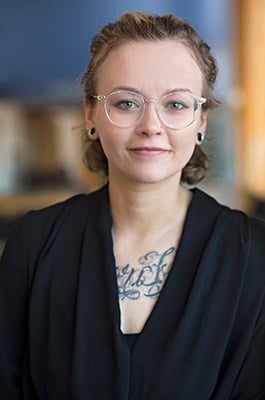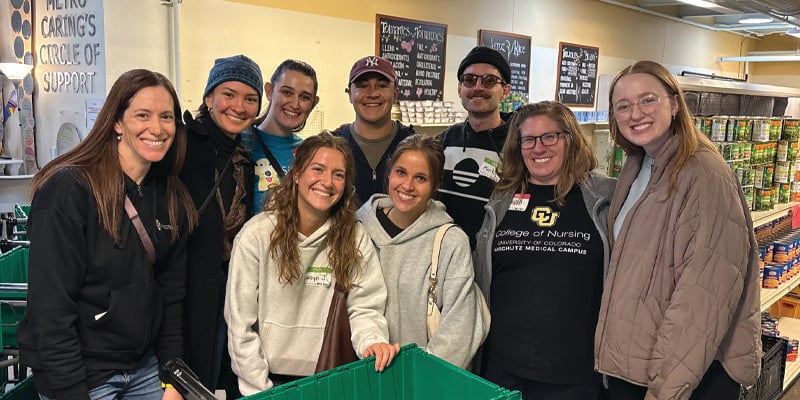As a parent with a history of substance use, Britt Westmoreland knows what it’s like to welcome a new baby during a difficult time.
“I was lucky enough to have my first child while in recovery,” Westmoreland says. “But I learned firsthand that the first year after giving birth is very risky for someone to return to substance use. In a perfect world, caring for a child should somehow motivate someone to stop using, but that’s not always the case.”
After getting support from counselors who address substance use disorder, Westmoreland saw peers struggle to raise children while holding a job and staying sober. Statistically, patients who use drugs experience high maternal mortality rates and are at a high risk of housing insecurity, depression, and even suicide.
Westmoreland started working in maternal substance-use care at a community corrections facility for mothers in 2019. She completed her peer-support doula training after obtaining a grant from the Integrated Care for Women and Babies program while serving as a peer-support specialist with the Sheridan Family Health Clinic.
She was recently hired as a peer-support doula with the Perinatal Peer Support Doula Program, managed by the University of Colorado College of Nursing at the CU Anschutz Medical Campus.
“I learned firsthand that the first year after giving birth is very risky for someone to return to substance use. In a perfect world, caring for a child should somehow motivate someone to stop using, but that’s not always the case.” – Britt Westmoreland, peer-support specialist trained as a doula, CU Nursing’s Perinatal Peer Support Doula Program
Overseen by CU College of Nursing Director of Midwifery Services Jessica Anderson, DNP ’17, CNM, the program provides support for the perinatal period during pregnancy and up to one year after giving birth. The program is funded by a grant from CU School of Medicine’s Practice Innovation Program (which has been contracted by the Colorado Department of Human Services’ Office of Behavioral Health to administer the Integrated Care for Women and Babies Program).
As a peer-support doula, Westmoreland provides encouragement and support during recovery in the perinatal period. She also offers guidance and resources to help people address their emotional and health-related needs.
“I have a passion for helping people – particularly during the perinatal period,” Westmoreland says. “That’s what brought me to this project. To see people die because of an accidental or intentional overdose is heart-wrenching and heartbreaking. The ramifications of what that does to a community, to a family, or a child could really put a ripple right in people's lives.”
About the program

Britt Westmoreland, peer-support specialist trained as a doula, |
Westmoreland is one of three peer-support specialist doulas who will be hired for the Perinatal Peer Support Doula Program. Amid surging maternal mortal rates and rising rates of postpartum drug overdoses and suicides, the concept has been developed among thought leaders in the healthcare community and CU Nursing.
“When you look at the mortality data in our state, it’s the year following birth that we see people dying,” Anderson says. “That's why we chose to provide one year of support after birth in this program. We feel it is really important not only to give people additional support, but also to prevent tragic outcomes.”
Westmoreland says she decided to become a peer-support doula as she learned about the increased stigmatization of people with substance use disorders and their barriers to healthcare.
“I provide sessions that apply a less clinical approach to mental health, like a therapist would,” Westmoreland says. “But the doula part of my job allows me to be present during labor and birth. It also helps me educate them more on the pregnancy and maternal side of things without necessarily getting the substance-use stuff mixed in.”
Anecdotal evidence suggests the program could be effective. Westmoreland cites a case of a “really tough patient” she worked with in an opioid treatment program a few years ago. The woman struggled with severe substance use disorder and lost two babies to complicated pregnancies. A third baby was born prematurely with many complications and wasn’t expected to live. However, both the mother and child persevered.
“I was able to sit with the mother and talk with her,” Westmoreland says. “She stopped using on the day that she gave birth. She is still sober now. Seeing that transformation meant a lot to me.”
As Westmoreland continues to recover from substance use disorder herself, her work with the program factors heavily into her own recovery. She was one of many community leaders who helped to pull the program together.
“The ‘giving back’ piece is huge in a lot of people’s recovery – including mine,” she says. “Always being in contact with where I was, or where I could’ve been, means a lot to me. And then hearing the feedback from patients that I helped validates me.”
Breaking ground in Colorado
While the Perinatal Peer Support Doula Program is in its infancy with room to grow, Anderson says it is truly groundbreaking in Colorado.
“What we’re doing is cutting edge – especially within the state,” Anderson says. “I think it’s very important to destigmatize substance use in the perinatal space. Substance use disorder is just like any other chronic condition, and we need to treat it. People can come into this program to manage addiction just like others manage conditions like high blood pressure and diabetes.”
One innovative approach the program uses is keeping in touch with patients on the phone rather than strictly by appointment.
“One thing I say to all my patients is that when I am at work, you are free to come and see me,” Westmoreland says. “In the meantime, if you need anything, text or call me and I’ll get back with you when I can. Of course, I’ve had to set some boundaries and make disclaimers. You can’t be texting me for no reason, but I think that one of the big things that sets peer-support doulas apart is the ability to reach out when you need to.”
Of course, three peer-support doulas won’t meet the growing needs of all pregnant people with substance-use issues in Colorado, but Anderson hopes the program will grow and flourish as they collect outcomes data and find new sources of funding.
Earlier this year, the program offered a free training for peer-support specialists through Elephant Circle, a community organization. That training attracted seven participants (including Westmoreland). Anderson is hopeful that others who took part in the course will apply for the open positions.
“I’m hoping that we get lots of people enrolled in the program who need extra support,” Anderson says. “Our goal is to start identifying additional funding to grow the program and keep it going.”
To learn more about the Perinatal Peer Support Doula Program, contact Jessica Anderson.



